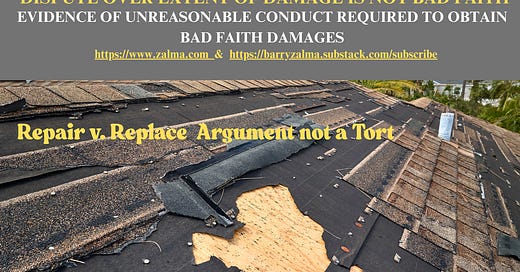Dispute Over Extent of Damage is not Bad Faith
Evidence of Unreasonable Conduct Required To Obtain Bad Faith Damages
Repair vs. Replace not a Tort
Read the full article at https://lnkd.in/giDvZbRX, see the full video at https://lnkd.in/gBNf3X6d and at https://lnkd.in/gkMFasYe and at https://zalma.com/blog plus more than 5100 posts.
Posted on June 17, 2025 by Barry Zalma
In Michael Gerstman and Marie Webster v. Crestbrook Insurance Company, Civil Action No. 3:24-CV-0635-D, United States District Court, N.D. Texas, Dallas Division (June 9, 2025)Michael Gerstman and Marie Webster sued Crestbrook Insurance Company over a storm damage insurance coverage dispute. The court proceedings include various claims related to breach of contract and violations of Texas insurance laws, following Crestbrook’s denial of the plaintiffs’ claim for damages caused by a hail and wind storm.
CASE BACKGROUND
The plaintiffs’ property in Dallas was insured under a policy issued by Crestbrook. A storm caused significant damage to the property, prompting the plaintiffs to file a claim with Crestbrook. An initial inspection by Crestbrook’s associate estimated damages at $6,061.68, which was below the plaintiffs’ $25,000 deductible, leading to a denial of the claim. Subsequently, the plaintiffs hired a public adjuster who estimated the repair costs at $137,545.19, including a full roof replacement, prompting Crestbrook to re-inspect the property and increase its damage estimate to $10,093.45, still falling short of the deductible .
EXPERT TESTIMONY
Crestbrook sought to strike the testimony of the plaintiffs’ experts, Dr. Neil Hall and Kevin Funsch, arguing that their opinions were irrelevant and unreliable. However, the court ruled that Dr. Hall’s testimony regarding the cause and extent of the damage was relevant and based on sufficient experience and methodology. The court also found that Funsch’s estimates were relevant to the claims being made by the plaintiffs.
SUMMARY JUDGMENT MOTIONS
Crestbrook filed for summary judgment on several claims, asserting that the plaintiffs could not prove their damages exceeded the deductible, thus Crestbrook was not liable under the policy. The trial court found that there was a genuine issue of fact regarding whether the damages exceeded the deductible, particularly in light of the differing estimates provided by the plaintiffs and Crestbrook.
VIOLATIONS OF TEXAS INSURANCE LAWS
Crestbrook also sought summary judgment on claims under the Texas Prompt Payment of Claims Act (TPPCA) and other violations of the Texas Insurance Code. The court determined that there was sufficient evidence to suggest that Crestbrook may have wrongfully denied or delayed payment, thus denying Crestbrook’s motion for summary judgment on these claims as well.
EXTRA-CONTRACTUAL CLAIMS
The plaintiffs asserted claims for common law bad faith and violations of the Texas Deceptive Trade Practices Act (DTPA). The court noted that a bona fide dispute regarding coverage precludes liability for bad faith claims. Since the court found genuine disputes regarding the breach of contract claim, Crestbrook could not obtain summary judgment on these extra-contractual claims. However, the court did grant summary judgment on the common law duty of good faith claim, as the plaintiffs failed to provide sufficient evidence of unreasonable conduct by Crestbrook.
CONCLUSION
The court ultimately denied Crestbrook’s motions to strike the expert opinions and granted in part and denied in part Crestbrook’s motion for summary judgment. The ruling allows the breach of contract and TPPCA claims to proceed, while dismissing certain extra-contractual claims.
The focus of a bad faith inquiry is on the reasonableness of the insurer’s conduct in rejecting or delaying payment of the claim. An insurer breaches the duty of good faith if it denies a claim when its liability has become reasonably clear. Moreover, an insurer cannot escape liability by failing to investigate a claim so that it can contend that liability was never reasonably clear; it breaches the duty of good faith and fair dealing by failing reasonably to investigate a claim.
A “bona fide dispute” regarding insurance coverage precludes liability for breach of the duty of good faith and fair dealing and violations of the DTPA and Texas Insurance Code. Because plaintiffs have failed to present evidence that would enable a reasonable jury to find in their favor on their claim for breach of the duty of good faith and fair dealing, the court granted Crestbrook’s motion for summary judgment as to these claims.
Insofar as plaintiffs have failed to produce evidence to support their remaining DTPA claims and have not suggested that any of these other claims is not based on the same theory underlying the bad faith claim the court granted summary judgment for Crestbrook on the remainingDTPA claims.
ZALMA OPINION
In the late 1960’s when I was a trainee adjuster the Supreme Court of California created a new tort called the tort of insurance bad faith. The tort has spread across the US and has been adopted by many states, like Texas, but the tort can be defeated if the insurer can establish a bona fide dispute. The insurer had a good faith dispute with the insured and its experts the bad faith tort was dismissed but the claim will still go to trial.
(c) 2025 Barry Zalma & ClaimSchool, Inc.
Please tell your friends and colleagues about this blog and the videos and let them subscribe to the blog and the videos.
Subscribe to my substack at https://barryzalma.substack.com/subscribe
Go to X @bzalma; Go to Barry Zalma videos at Rumble.com at https://rumble.com/account/content?type=all; Go to Barry Zalma on YouTube- https://www.youtube.com/channel/UCysiZklEtxZsSF9DfC0Expg; Go to the Insurance Claims Library – https://lnkd.in/gwEYk.








